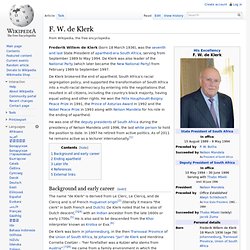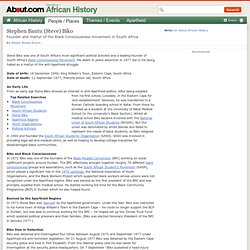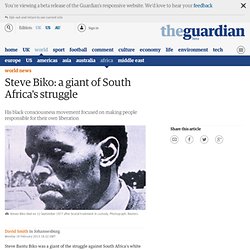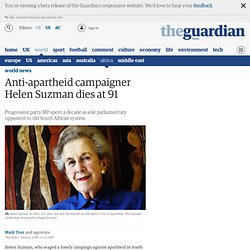

F. W. de Klerk. De Klerk brokered the end of apartheid, South Africa's racial segregation policy, and supported the transformation of South Africa into a multi-racial democracy by entering into the negotiations that resulted in all citizens, including the country's black majority, having equal voting and other rights.

He won the Félix Houphouët-Boigny Peace Prize in 1991, the Prince of Asturias Award in 1992 and the Nobel Peace Prize in 1993 along with Nelson Mandela for his role in the ending of apartheid. He was one of the deputy presidents of South Africa during the presidency of Nelson Mandela until 1996, the last white person to hold the position to date. In 1997 he retired from active politics. As of 2011[update] he remains active as a lecturer internationally.[1] Background and early career[edit] The name "de Klerk" is derived from Le Clerc, Le Clercq, and de Clercq and is of French Huguenot origin[2] (literally it means "the clerk" in both French and Dutch). Ending apartheid[edit] P. Short Biography: Stephen Bantu (Steve) Biko. Steve Biko was one of South Africa's most significant political activists and a leading founder of South Africa's Black Consciousness Movement.

His death in police detention in 1977 led to his being hailed as a martyr of the anti-Apartheid struggle. Date of birth: 18 December 1946, King William's Town, Eastern Cape, South AfricaDate of death: 12 September 1977, Pretoria prison cell, South Africa An Early LifeFrom an early age Steve Biko showed an interest in anti-Apartheid politics. After being expelled from his first school, Lovedale, in the Eastern Cape for 'anti-establishment' behavior, he was transferred to a Roman Catholic boarding school in Natal. From there he enrolled as a student at the University of Natal Medical School (in the university's Black Section).
Biko and Black ConsciousnessIn 1972 Biko was one of the founders of the Black Peoples Convention (BPC) working on social upliftment projects around Durban. Steve Biko: a giant of South Africa's struggle. Steve Bantu Biko was a giant of the struggle against South Africa's white minority rule and arguably its most famous martyr.

But he was never a member of Africa's oldest liberation movement, the African National Congress (ANC). Born in Tylden, in the Eastern Province (now Eastern Cape), on 18 December 1946, he was academically gifted but ran up against policies designed to thwart black education. He rebelled, was interrogated by police and expelled from school, giving him what he described as a "strong resentment toward white authority". At university Biko formed the South African Students Organisation, raising awareness of how black students suffered compared to their white counterparts. His black consciousness movement focused on making people responsible for their own liberation. In 1973 a government order banned him from leaving his home of King Williamstown. In August 1977 Biko was arrested at a roadblock and detained in prison. Helen Suzman, South African anti-apartheid campaigner, dies at 91. Helen Suzman, who waged a lonely campaign against apartheid in South Africa's parliament for more than a decade, has died at the age of 91.

Her daughter, Frances Jowell, said she died peacefully this morning at her home in Johannesburg, and a private funeral would take place this weekend. Jowell added: "We are waiting for family and all grandchildren to arrive. " For 13 years, from 1961 to 1974, Suzman was the sole representative in parliament of the liberal Progressive party, and her opposition to apartheid made her a thorn in the flesh of the National party government.
She became known as a "cricket in the thorn tree" for her outspoken views. She was regularly jeered in parliament with taunts such as "Go back to Moscow" or "Go back to Israel" – a reference to her Jewish family. The enmity was mutual. Suzman was born in Germiston, in South Africa's Gauteng province, on 7 November 1917 to a Jewish Lithuanian immigrant couple, Samuel and Frieda Gavronsky.